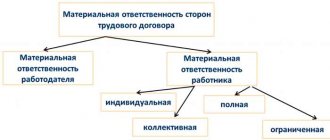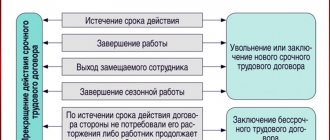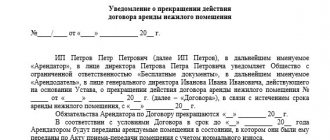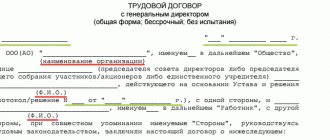Last modified: January 2021
A fixed-term employment contract is concluded for a certain period. The parties agree in advance on the termination date of the agreement. It is determined by a specific calendar date, event or occurrence of a certain condition. During the period of validity of the contract, a citizen can find a permanent job, move to another city, enroll in a university as a full-time student, or retire. Therefore, in practice, the question arises whether early termination of a fixed-term employment contract is possible at the initiative of the employee.
Article 77. General grounds for termination of an employment contract
The grounds for termination of an employment contract are:
1) agreement of the parties (Article 78 of this Code);
2) expiration of the employment contract (Article 79 of this Code), except for cases where the employment relationship actually continues and neither party has demanded its termination;
3) termination of an employment contract at the initiative of the employee (Article 80 of this Code);
4) termination of an employment contract at the initiative of the employer (Articles 71 and 81 of this Code);
5) transfer of an employee, at his request or with his consent, to work for another employer or transfer to an elective job (position);
6) the employee’s refusal to continue working in connection with a change in the owner of the organization’s property, a change in the jurisdiction (subordination) of the organization or its reorganization (Article 75 of this Code);
7) the employee’s refusal to continue working due to a change in the terms of the employment contract determined by the parties (part four of Article 74 of this Code);
 the employee’s refusal to transfer to another job, required for him in accordance with a medical report issued in the manner established by federal laws and other regulatory legal acts of the Russian Federation, or the employer’s lack of relevant work (parts three and four of Article 73 of this Code);
the employee’s refusal to transfer to another job, required for him in accordance with a medical report issued in the manner established by federal laws and other regulatory legal acts of the Russian Federation, or the employer’s lack of relevant work (parts three and four of Article 73 of this Code);
9) the employee’s refusal to be transferred to work in another location together with the employer (part one of Article 72.1 of this Code);
10) circumstances beyond the control of the parties (Article 83 of this Code);
11) violation of the rules for concluding an employment contract established by this Code or other federal law, if this violation excludes the possibility of continuing work (Article 84 of this Code).
(Part one as amended by Federal Law No. 90-FZ dated June 30, 2006)
An employment contract may be terminated on other grounds provided for by this Code and other federal laws.
Part three is no longer valid. — Federal Law of June 30, 2006 N 90-FZ.
Payments
In the event that a fixed-term employment contract is terminated prematurely, the dismissed employee must receive:
- Salary for the last month worked (in proportion to the number of days worked or output - depending on the terms of the employment contract).
- Compensation for unused vacation (read about how to correctly arrange vacation with subsequent dismissal or terminate a TD during an annual vacation here). If an employee has worked for six months or more, then he receives compensation in full for 28 days (if, according to the Labor Code of the Russian Federation, he cannot claim a longer vacation period), if less, then the number of days for which the average income is paid is calculated in proportion to the number of months worked.
- If there is a reduction in staff or numbers - severance pay in the amount of the average monthly salary. If the employee agrees to resign before the expiration of the notice period, then compensation is paid for this as well.
- In case of liquidation of an enterprise - severance pay in the amount of average monthly earnings.
In addition, if dismissal occurs by agreement of the parties, the employee may receive additional payments provided for in this agreement .
Details about how long and what payments should be transferred to the resigning employee can be found here.
Article 79. Termination of a fixed-term employment contract
(as amended by Federal Law No. 90-FZ of June 30, 2006)
A fixed-term employment contract is terminated upon expiration of its validity period. The employee must be notified in writing of the termination of the employment contract due to its expiration at least three calendar days before dismissal, with the exception of cases where a fixed-term employment contract concluded for the duration of the duties of the absent employee expires.
(Part one as amended by Federal Law No. 90-FZ dated June 30, 2006)
An employment contract concluded for the duration of a specific work is terminated upon completion of this work.
(as amended by Federal Law No. 90-FZ of June 30, 2006)
An employment contract concluded for the duration of the duties of an absent employee is terminated when this employee returns to work.
(as amended by Federal Law No. 90-FZ of June 30, 2006)
An employment contract concluded to perform seasonal work during a certain period (season) is terminated at the end of this period (season).
(Part four as amended by Federal Law No. 90-FZ of June 30, 2006)
Results
Termination of a fixed-term employment contract must be carried out in accordance with all the rules enshrined in the Labor Code of the Russian Federation, in compliance with the established deadlines.
Otherwise, if conflict situations arise between the parties, termination of the contract will have to be carried out on a general basis, involving longer service or, possibly, a higher level of payments upon dismissal. You can find more complete information on the topic in ConsultantPlus. Free trial access to the system for 2 days.
Article 80. Termination of an employment contract at the initiative of the employee (at his own request)
An employee has the right to terminate an employment contract by notifying the employer in writing no later than two weeks in advance, unless a different period is established by this Code or other federal law. The specified period begins the next day after the employer receives the employee’s resignation letter.
(as amended by Federal Law No. 90-FZ of June 30, 2006)
By agreement between the employee and the employer, the employment contract can be terminated even before the expiration of the notice period for dismissal.
In cases where the employee’s application for dismissal on his initiative (at his own request) is due to the impossibility of continuing his work (enrollment in an educational institution, retirement and other cases), as well as in cases of established violation by the employer of labor legislation and other regulatory legal acts, containing labor law norms, local regulations, terms of a collective agreement, agreement or employment contract, the employer is obliged to terminate the employment contract within the period specified in the employee’s application.
(as amended by Federal Law No. 90-FZ of June 30, 2006)
Before the expiration of the notice period for dismissal, the employee has the right to withdraw his application at any time. Dismissal in this case is not carried out unless another employee is invited in his place in writing, who, in accordance with this Code and other federal laws, cannot be denied an employment contract.
Upon expiration of the notice period for dismissal, the employee has the right to stop working. On the last day of work, the employer is obliged to issue the employee a work book and other documents related to the work, upon the employee’s written application, and make a final payment to him.
If, upon expiration of the notice period for dismissal, the employment contract has not been terminated and the employee does not insist on dismissal, then the employment contract continues.
Reasons for early dismissal and possible initiators
Like any employment contract, a fixed-term one is terminated for the following reasons:
- At the request of the employee.
- At the request of the employer.
- By agreement of the parties.
- Due to circumstances that do not depend on the will of both parties.
Thus, the initiators for termination may be:
- The employee himself.
- His employer.
However, you need to remember the following:
- An employee can quit simply because he wants to. Art. 80 of the Labor Code of the Russian Federation, which gives him such a right, does not imply any restrictions or even explanations.
- If the contract is terminated at the initiative of the parties, and both agree to dismissal during the validity of the TD, then the reasons can also be any.
- The employer has the right to dismiss an employee only in clearly defined cases listed in Art. 81 Labor Code of the Russian Federation. Although the list of grounds is very wide, it can be supplemented by other federal laws - in general, it is exhaustive. An employer cannot dismiss an employee on grounds not provided for by law.
Read about whether you can be asked to leave your job during a probationary period and whether an employee himself can initiate such dismissal.
Article 81. Termination of an employment contract at the initiative of the employer
An employment contract can be terminated by the employer in the following cases:
1) liquidation of an organization or termination of activities by an individual entrepreneur;
(as amended by Federal Law No. 90-FZ of June 30, 2006)
2) reduction in the number or staff of employees of an organization or individual entrepreneur;
(as amended by Federal Law No. 90-FZ of June 30, 2006)
3) the employee’s inconsistency with the position held or the work performed due to insufficient qualifications confirmed by certification results;
(clause 3 as amended by Federal Law dated June 30, 2006 N 90-FZ)
4) change of owner of the organization’s property (in relation to the head of the organization, his deputies and the chief accountant);
5) repeated failure by an employee to perform labor duties without good reason, if he has a disciplinary sanction;
6) a single gross violation by an employee of labor duties:
a) absenteeism, that is, absence from the workplace without good reason throughout the entire working day (shift), regardless of its duration, as well as in the case of absence from the workplace without good reason for more than four hours in a row during the working day ( shifts);
(as amended by Federal Law No. 90-FZ of June 30, 2006)
b) the appearance of an employee at work (at his workplace or on the territory of an organization - employer or facility where, on behalf of the employer, the employee must perform a labor function) in a state of alcohol, narcotic or other toxic intoxication;
(clause “b” as amended by Federal Law dated June 30, 2006 N 90-FZ)
c) disclosure of secrets protected by law (state, commercial, official and other) that became known to the employee in connection with the performance of his job duties, including disclosure of personal data of another employee;
(as amended by Federal Law No. 90-FZ of June 30, 2006)
d) committing at the place of work theft (including small) of someone else's property, embezzlement, intentional destruction or damage, established by a court verdict that has entered into legal force or a decision of a judge, body, official authorized to consider cases of administrative offenses;
(as amended by Federal Law No. 90-FZ of June 30, 2006)
e) a violation by an employee of labor safety requirements established by the labor safety commission or the labor safety commissioner, if this violation entailed serious consequences (industrial accident, breakdown, catastrophe) or knowingly created a real threat of such consequences;
(as amended by Federal Law No. 90-FZ of June 30, 2006)
7) commission of guilty actions by an employee directly servicing monetary or commodity assets, if these actions give rise to a loss of confidence in him by the employer;
 the commission by an employee performing educational functions of an immoral offense incompatible with the continuation of this work;
the commission by an employee performing educational functions of an immoral offense incompatible with the continuation of this work;
9) making an unjustified decision by the head of the organization (branch, representative office), his deputies and the chief accountant, which entailed a violation of the safety of property, its unlawful use or other damage to the property of the organization;
10) a single gross violation by the head of the organization (branch, representative office), his deputies of their labor duties;
11) the employee submits false documents to the employer when concluding an employment contract;
(as amended by Federal Law No. 90-FZ of June 30, 2006)
12) has become invalid. — Federal Law of June 30, 2006 N 90-FZ;
13) provided for in the employment contract with the head of the organization, members of the collegial executive body of the organization;
14) in other cases established by this Code and other federal laws.
The procedure for certification (clause 3 of part one of this article) is established by labor legislation and other regulatory legal acts containing labor law norms, local regulations adopted taking into account the opinion of the representative body of workers.
(Part two as amended by Federal Law No. 90-FZ of June 30, 2006)
Dismissal on the grounds provided for in paragraph 2 or 3 of part one of this article is permitted if it is impossible to transfer the employee with his written consent to another job available to the employer (both a vacant position or work corresponding to the employee’s qualifications, and a vacant lower position or lower-paid job) which the employee can perform taking into account his state of health. In this case, the employer is obliged to offer the employee all vacancies available in the given area that meet the specified requirements. The employer is obliged to offer vacancies in other localities if this is provided for by the collective agreement, agreements, or employment contract.
(Part three as amended by Federal Law No. 90-FZ of June 30, 2006)
In the event of termination of the activities of a branch, representative office or other separate structural unit of an organization located in another locality, termination of employment contracts with employees of this unit is carried out according to the rules provided for cases of liquidation of the organization.
(Part four as amended by Federal Law No. 90-FZ of June 30, 2006)
Dismissal of an employee on the grounds provided for in paragraph 7 or 8 of part one of this article, in cases where guilty actions giving grounds for loss of confidence, or, accordingly, an immoral offense were committed by the employee outside the place of work or at the place of work, but not in connection with the performance of his labor duties, is not allowed later than one year from the date of discovery of the misconduct by the employer.
(Part five was introduced by Federal Law No. 90-FZ of June 30, 2006)
It is not allowed to dismiss an employee at the initiative of the employer (except in the case of liquidation of an organization or termination of activities by an individual entrepreneur) during the period of his temporary incapacity for work and while on vacation.
(Part six introduced by Federal Law No. 90-FZ of June 30, 2006)
Why is it worth making an agreement?
Dismissal can occur in three main forms:
- at your own request;
- “according to the article”;
- peacefully, i.e. by agreement.
All of them are encountered quite often in practice, but it is the third option that is considered the most acceptable and desirable. This is due to the fact that it has some advantages both for the employee of the enterprise and for his employer.
The positive aspects for the employee are quite obvious:
- He can leave without “working off”, or, conversely, has the opportunity to request the time he needs to look for a new job (above the usual two weeks).
- With the consent of management, he can receive decent “compensation”.
- And in the employment service, if a person who quits by agreement of the parties decides to register there, the benefit will be much larger than in other cases.
- In addition, if the employee can maintain a good relationship with the former employer, the employee is likely to receive exceptionally good letters of recommendation - and such arguments often play a fundamental role in the decision to accept a job from large company recruiters.
Advantages of dismissal by agreement for the employer:
- The likelihood that in the future the employee will withdraw his application for termination of the employment relationship is reduced to zero (which is extremely important in cases where the employee has become redundant or unwanted for some reason).
- With this form of dismissal, there is no need to listen to the opinion of the trade union cell, which, as is known, does not always coincide with the opinion of the employer.
- If for some reason the case reaches the judicial service or the labor inspectorate, the enterprise management will have evidence that everything happened according to the law (of course, if the procedure is completed in compliance with all the necessary formalities).
Article 83. Termination of an employment contract due to circumstances beyond the control of the parties
The employment contract is subject to termination due to the following circumstances beyond the control of the parties:
1) conscription of an employee for military service or sending him to an alternative civilian service that replaces it;
2) reinstatement of an employee who previously performed this work, by decision of the state labor inspectorate or court;
3) failure to be elected to office;
4) sentencing of an employee to a punishment that precludes the continuation of previous work, in accordance with a court verdict that has entered into legal force;
5) recognition of the employee as completely incapable of working in accordance with a medical certificate issued in the manner established by federal laws and other regulatory legal acts of the Russian Federation;
(as amended by Federal Law No. 90-FZ of June 30, 2006)
6) death of an employee or employer - an individual, as well as recognition by a court of an employee or employer - an individual as deceased or missing;
7) the occurrence of emergency circumstances that impede the continuation of labor relations (military action, catastrophe, natural disaster, major accident, epidemic and other emergency circumstances), if this circumstance is recognized by a decision of the Government of the Russian Federation or a government body of the relevant subject of the Russian Federation;
 disqualification or other administrative punishment that precludes the employee from fulfilling his duties under the employment contract;
disqualification or other administrative punishment that precludes the employee from fulfilling his duties under the employment contract;
(Clause 8 introduced by Federal Law No. 90-FZ of June 30, 2006)
9) expiration, suspension of validity for a period of more than two months or deprivation of an employee of a special right (license, right to drive a vehicle, right to carry a weapon, other special right) in accordance with federal laws and other regulatory legal acts of the Russian Federation, if this entails the impossibility of the employee fulfilling his duties under the employment contract;
(Clause 9 introduced by Federal Law dated June 30, 2006 N 90-FZ)
10) termination of access to state secrets if the work performed requires such access;
(Clause 10 introduced by Federal Law No. 90-FZ of June 30, 2006)
11) reversal of a court decision or cancellation (declare illegal) of the decision of the state labor inspectorate to reinstate the employee at work;
(Clause 11 introduced by Federal Law dated June 30, 2006 N 90-FZ)
12) bringing the total number of employees who are foreign citizens or stateless persons in accordance with the permissible share of such employees established by the Government of the Russian Federation for employers carrying out certain types of economic activities on the territory of the Russian Federation;
(Clause 12 introduced by Federal Law dated December 30, 2006 N 271-FZ)
13) the occurrence of restrictions on engaging in certain types of labor activity established by this Code, other federal law and excluding the possibility of an employee fulfilling his duties under an employment contract.
(Clause 13 introduced by Federal Law dated December 23, 2010 N 387-FZ)
Termination of an employment contract on the grounds provided for in paragraphs 2, 8, 9, 10 or 13 of part one of this article is permitted if it is impossible to transfer the employee with his written consent to another job available to the employer (either a vacant position or a job that corresponds to the employee’s qualifications, or and a vacant lower position or lower paid job) that the employee can perform taking into account his state of health. In this case, the employer is obliged to offer the employee all vacancies available in the given area that meet the specified requirements. The employer is obliged to offer vacancies in other localities if this is provided for by the collective agreement, agreements, or employment contract.
(as amended by Federal Laws dated June 30, 2006 N 90-FZ, dated December 23, 2010 N 387-FZ)
An employment contract on the basis provided for in paragraph 12 of part one of this article is terminated no later than the end of the period established by the Government of the Russian Federation for employers carrying out certain types of economic activities on the territory of the Russian Federation to bring the total number of employees who are foreign citizens or stateless persons to compliance with the permissible share of such employees.
(Part three introduced by Federal Law of December 30, 2006 N 271-FZ)
Cons of the agreement
To be fair, it should be said that terminating an employment relationship by agreement also has its downsides. In particular:
- in most cases, the employee does not have the right to withdraw his application unilaterally;
- The company's management can fire him even during a period of temporary incapacity.
Sometimes employers refuse to reach an agreement with an employee, especially if the latter has previously committed a serious offense.
Peculiarities
An employee can be hired by an individual running a business. In order to terminate a fixed-term work contract in such a situation, specific grounds must be used:
- death of the employer;
- absence of the employer for sixty days without any information about his location.
In this situation, the employee independently visits the local government body to register the employment agreement and notify that it has lost its actual force.
In addition, for people working for individuals, at home, or for remote work, the grounds for leaving work are specified in the employment contract itself.
If the employee is a foreign citizen, except on a general basis, the contract may lose force even when the person’s legal stay on the territory of Russia has expired.
Teachers serving in educational organizations leave their jobs on a general basis, but here there are some additional reasons why they can be fired:
- gross violations of the institution’s charter, committed repeatedly in one year;
- use of brute physical force against students;
- reaching the age of a pensioner - sixty-five years, and with the consent of the academic council - seventy.
For employee-athletes, an additional basis for early departure is disqualification for six months or the fact of doping use, which has been proven.
How to place an order
The employee must be notified of the termination of a fixed-term contract no later than 3 days in advance by providing him with a written notice on behalf of the manager against signature. When replacing an absent employee, notification is made on the day the latter returns.
Within the enterprise, its own sample Order for termination of a fixed-term employment contract is formed. When drawing up the next one, they focus on it. The document is written arbitrarily or a unified form is used. For example, at the end of the validity period it will be Form T-8. The order contains the following information:
- Information about the employer (name, address).
- Information about the employee (full name, position, personnel number, structural unit).
- Details of the fixed-term contract (date of conclusion, number).
- Grounds for termination of the contract with reference to the article of the Labor Code of the Russian Federation.
- Date of dismissal.
- Date of formation of the Order.
- Signature of the head and seal of the structure.
The employee puts a signature on the Order indicating familiarization. If this is impossible or he refuses, a corresponding Act is drawn up regarding the fact.
In general, when terminating a fixed-term employment contract, the general rules of the Labor Code of the Russian Federation apply. There are only a number of nuances. They are associated with the limited validity period of such a document.
Valery Isaev graduated from the Moscow State Law Institute. Over the years of work in the legal profession, he has conducted many successful civil and criminal cases in courts of various jurisdictions. Extensive experience in legal assistance to citizens in various fields.
Termination of a fixed-term employment contract occurs on a general basis in accordance with Article 77 of the Labor Code.
In fact, it does not matter what kind of agreement (contract) was signed by the employer and his employee - a fixed-term one, with a limited period of work, or an open-ended one, with an indefinite period of validity. In both cases, the employee has the legal right to terminate the contract on his own initiative.
It does not matter whether the employee has any valid reasons for this action.
Consequences
The main feature of a fixed-term employment contract is the strict time frame within which it is valid. During this period, the hired person undertakes to perform the work described in the document, and the employer undertakes to pay for this work in the established amount.
Since time limitation is an immutable requirement, the party who wishes to terminate the agreement takes responsibility for failure to comply with the deadlines allotted for the performance of work activities.
If objections arise, the passive participant in the fixed-term contract has the right to arrange proceedings using the work book and consideration of disagreements in court, if weighty arguments are attached to the case.
In order to correctly terminate a fixed-term employment contract on the employee’s own initiative, he must:
- carefully read the fixed-term contract and establish the clauses that describe the conditions (including compensation for unused vacation upon dismissal);
- establish the reasons indicating non-compliance with these conditions;
- clearly state the reason for dismissal;
- form an agreement between the parties to the contract based on this reason;
- indicate in it a list of papers proving the validity of the operation;
- secure the contents of the document with the employer’s seal and the signatures of the participants.
So, an employee has every right to terminate a fixed-term employment agreement at will, but such a case requires the correct actions to avoid various troubles. It is also optimal to take into account the possibility of early cancellation of the contract at the stage of its conclusion.
If at an enterprise the relationship between management and subordinates is built on an official basis, their basis is always an employment contract. It is an agreement between the parties about what rights and responsibilities are assigned to the employee, what obligations the employer undertakes.
The best contract would be a document that stipulates every little detail, providing for everything that concerns a specific function, a specific workplace.
The manager must understand that any contract he concludes with an employee as a result of a labor dispute will become the basis for the court to make a certain verdict. This should not be forgotten by employees who sign the document, which immediately acquires legal force.
An agreement between the parties to the labor process is a thread that closely connects the manager and the employee and has a legal basis. Its action can be terminated at the initiative of either party.










